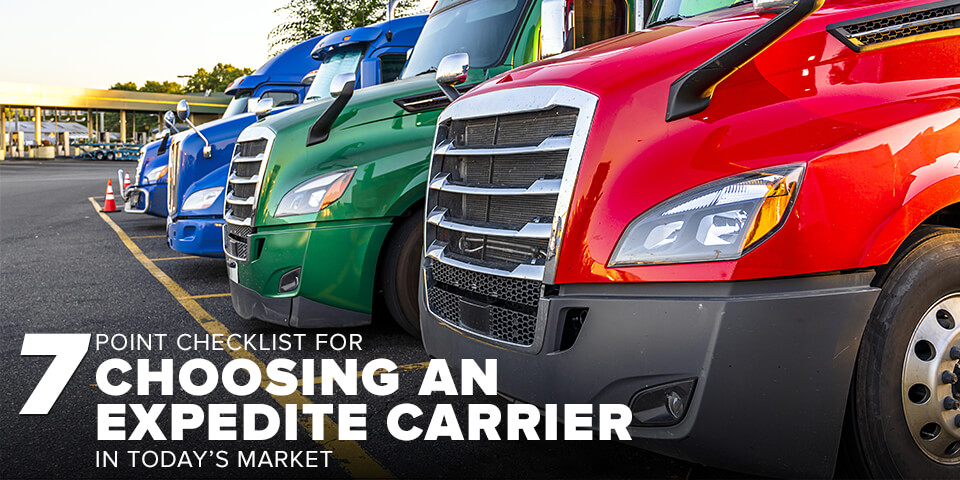In The News

7-Point Checklist for Choosing an Expedite Carrier in Today’s Market
The trucking industry, including the expedite market, has endured a tumultuous several months as several high-profile and smaller carriers have shut their doors.
So, if you’re an owner-operator or fleet owner, it’s more important than ever to align yourself with a carrier that best fits your business—and is built to weather the storms.
What should you look for in a carrier? Here is a seven-point checklist to help you cover your bases.
1. Does the carrier accept the type of vehicle(s) I intend to run?
What type of vehicle—straight truck, tractor, or cargo van—will you be using for your expedite business?
Suppose, for example, you want to run cargo vans because of the lower upfront cost compared to straight trucks and tractors. In today’s slower freight market, many carriers that traditionally sign-on cargo vans have started cutting back on those vehicles.
So, before investing in a van, make sure the carriers that have made your "short list" still support your vehicle type at a level that will enable you to succeed.
2. What does the carrier bring to the table to help support your business growth?
Is the carrier a financially stable company that you can envision growing with for the long haul? Does it offer the support and resources you need to help you succeed if you're willing to put in the work—whether you have one truck or a large fleet?
The key here is to find this out upfront so that you avoid the hassle of moving from carrier to carrier to finally discover the best fit for your business.
3. Does the carrier have a diversified book of business?
Who are the carrier’s primary customers? Is the company locked into one industry, where its success—and yours—is tied to the health of that market? Or does the carrier serve a wider range of industries?
Especially in a slower overall freight market, you want to look for carriers with a diversified book of business and strong sales teams in place to secure contracts directly with shippers, instead of being overly dependent upon load-board bids to generate business.
This way, if a particular market segment does encounter a downturn, the carrier will have enough shipping contracts in place to help them—and you—weather the storm.
4. How will you be paid?
Does the carrier pay by flat rate per loaded mile or percentage of revenue on each load?
The idea here is to run numbers that compare flat rate and percentage pay plans based on the specifics of your situation—to determine which route would be most advantageous to you.
Another component of compensation is fuel surcharge. It can be a challenge to accurately figure out which companies offer the best rates because they all calculate fuel surcharge differently. Therefore, ask each carrier how they calculate their rates and whether they pay on all miles or only on loaded miles. If it’s “all miles,” find out what the difference is in fuel surcharge for loaded and unloaded miles.
(For more information, check out the Fuel Surcharge Calculator on the Owner-Operator Independent Drivers Association website.)
5. What is the payment cycle?
No matter what’s included in a carrier’s compensation plan, if you have to wait on your money longer than you expect, that delay in cash flow could sink your business before it gets started.
So, eliminate unpleasant surprises by knowing precisely when you should get paid and how the process works to ensure timely payment.
6. What upfront expenses will I be responsible for?
Carriers typically collect escrow from drivers to cover insurance deductibles, fuel taxes, and other services included in the lease agreement. Find out how much escrow is collected and what’s included. Some carriers will offer drivers the option to make weekly payments to help reduce the upfront cash burden.
The critical point here is to include these upfront expenses in your calculations to determine which company is offering the most competitive overall compensation package.
7. What’s the carrier’s reputation?
Talk with other drivers, owner-operators, and fleet owners about their experiences with a carrier. Most of the people you speak with won’t be afraid to give you the unvarnished truth.
So, think about the carriers you’re considering. What’s the sense you get about their company culture? Is it an environment in which you think your business could thrive? Do you feel that you would be treated with honesty and respect?
The Bottom Line
Most carriers offer similar compensation and benefits. But, the critical question to ask yourself: “Will I be happy partnering with this company?”
